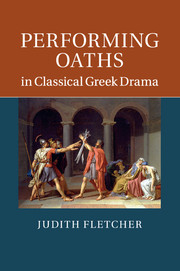Book contents
- Frontmatter
- Contents
- Acknowledgments
- A note on abbreviations
- Introduction
- Chapter 1 From curses to blessings: horkos in the Oresteia
- Chapter 2 Speaking like a man: oaths in Sophocles’ Trachiniae and Philoctetes
- Chapter 3 Horkos in the polis: Athens, Thebes and Sophocles
- Chapter 4 Perjury and other perversions: Euripides’ Phoenissae, Orestes and Cyclops
- Chapter 5 Twisted justice in Aristophanes’ Clouds
- Chapter 6 Women and oaths in Euripides
- Chapter 7 How to do things with Euripides: Aristophanes’ Thesmophoriazusae
- Chapter 8 Swearing off sex: the women's oath in Aristophanes’ Lysistrata
- Conclusion
- Bibliography
- Index locorum
- General index
Chapter 8 - Swearing off sex: the women's oath in Aristophanes’ Lysistrata
Published online by Cambridge University Press: 05 December 2011
- Frontmatter
- Contents
- Acknowledgments
- A note on abbreviations
- Introduction
- Chapter 1 From curses to blessings: horkos in the Oresteia
- Chapter 2 Speaking like a man: oaths in Sophocles’ Trachiniae and Philoctetes
- Chapter 3 Horkos in the polis: Athens, Thebes and Sophocles
- Chapter 4 Perjury and other perversions: Euripides’ Phoenissae, Orestes and Cyclops
- Chapter 5 Twisted justice in Aristophanes’ Clouds
- Chapter 6 Women and oaths in Euripides
- Chapter 7 How to do things with Euripides: Aristophanes’ Thesmophoriazusae
- Chapter 8 Swearing off sex: the women's oath in Aristophanes’ Lysistrata
- Conclusion
- Bibliography
- Index locorum
- General index
Summary
According to J. L. Austin's ironically officious “Doctrine of the Infelicities,” in order for a performative utterance to be effective “the particular persons and circumstances in a given case must be appropriate for the invocation for the particular procedures invoked,” and these procedures must be executed correctly and completely. A set of rules and processes govern the performance of the oath: a higher power is invoked, and a linguistic formula commits oath-swearers to certain behavior or guarantees the truth of what they say. In some cases there are gestures, the handling of ritual objects, the performance of sacrifices, and self-imprecations. These ancillary acts are not required for oaths to be valid; nonetheless they need to be executed correctly when they do occur. As we have seen throughout this book, Greek drama might feature infringements of oath protocols as a way of signifying some social aberration. The monstrous Clytemnestra distorts the oath's ritual formulae; Silenus is impaled by his incompetent execration; an Asiatic eunuch perjures himself with a truncated version of an oath. These perverted or malformed oaths contrast with the more felicitous oaths sworn in Athens by such figures as Orestes and Oedipus. Oaths are rule-governed forms of discourse: their performative power is implicitly correlative with traditional configurations of power. But rules also suggest alternate possibilities; the violation of oath protocols evokes inversion, subversion and even revolution.
I would like to end my investigation of the dramatic oath by examining how distortions of the conventions that govern the performance of the oath become associated with social change. The case in point is the temporary gynaecocracy of Aristophanes’ Lysistrata which emanates from an oath by Greek wives to abstain from sex with their husbands. It is an eccentric oath that deviates from the norms and practices of conventional oath ceremonies, and yet its procedural violations are implicated in the creation of a new social order that eschews the bloodshed implicated in the performance of every proper oath.
- Type
- Chapter
- Information
- Performing Oaths in Classical Greek Drama , pp. 220 - 240Publisher: Cambridge University PressPrint publication year: 2011



